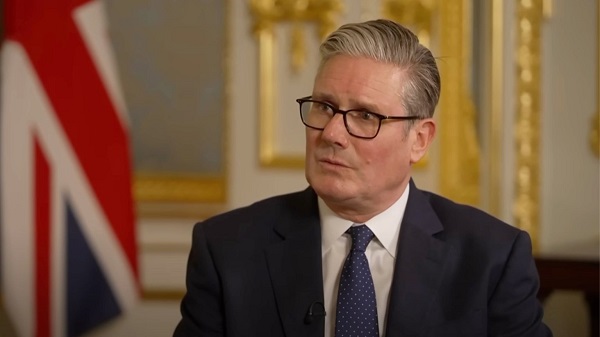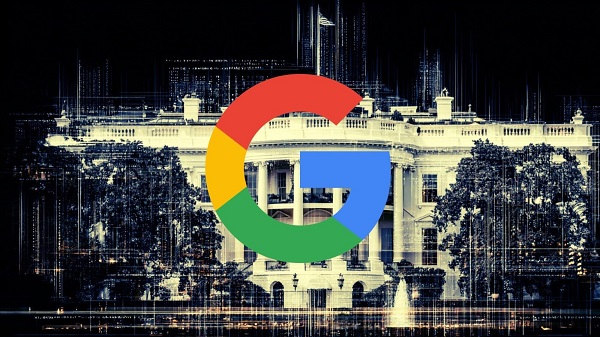Censorship Industrial Complex
Digital ID UK: Starmer’s Expanding Surveillance State

Britain’s digital ID push isn’t about streamlining paperwork. It’s about hardwiring state power into everyday life.
|
UK Prime Minister Keir Starmer came into office promising competence and calm after years of alleged political chaos.
What has followed is a government that treats civil liberties as disposable. Under his watch, police have leaned on broad public order powers to detain people over “offensive” tweets.
Critics argue that what counts as “offensive” now changes depending on the political mood, which means ordinary citizens find themselves guessing at what might trigger a knock on the door.
This is happening while mass facial recognition cameras are being installed in public places.
The pattern is clear: expand surveillance, narrow dissent, and then assure the public it is all in the name of safety and order.
Against that backdrop, a digital ID system looks less like modernization and more like the missing piece in an expanding control grid.
Once every adult is forced to plug into a centralized identity wallet to work, rent, or access services, the state’s ability to monitor and sanction becomes unprecedented.
Starmer’s Labour government is dusting off one of its oldest obsessions: the dream of tagging every citizen like a parcel at the post office.
The latest revival comes in the form of a proposal to create mandatory digital ID cards, already nicknamed the “Brit Card,” for every working adult in the country.
The sales pitch sounds noble enough: crack down on illegal work, cut fraud, plug loopholes. The real effect would be to make ordinary life a permanent identity check.
Officials want job applications, rental agreements, and other basic transactions to be filtered through a government database, accessed through an app.
This, the people are told, will finally stop the shadow economy of dodgy employers. If that logic sounds familiar, it is because it is the same rationale Labour used for its last ID card scheme in the 2000s, a project that ended up in the political landfill in 2010 after enough voters realized what was happening.
“Digital ID is an enormous opportunity for the UK. It will make it tougher to work illegally in this country, making our borders more secure,” Starmer said in his announcement. “And it will also offer ordinary citizens countless benefits, like being able to prove your identity to access key services swiftly – rather than hunting around for an old utility bill.”
Campaigners and data rights groups are not buying the rebrand.
For Liberty’s Gracie Bradley cut straight to the point: the new version “is likely to be even more intrusive, insecure and discriminatory” than the one the country already threw out a decade ago.
That does not bode well for a government trying to convince citizens this time will be different.
Rebecca Vincent of Big Brother Watch spelled out where this all leads: “While Downing Street is scrambling to be seen as doing something about illegal immigration, we are sleepwalking into a dystopian nightmare where the entire population will be forced through myriad digital checkpoints to go about our everyday lives.”
Her warning does not require much imagination. Britain has a spotty track record on protecting sensitive data.
A poll commissioned by Big Brother Watch found that nearly two-thirds of the public already think the government cannot be trusted to protect their data. That is before any giant centralized ID system is rolled out.
Privacy advocates see this as a recipe for disaster, arguing that hackers and snooping officials alike will treat the system as a buffet of personal information.
Former Cabinet Minister David Davis, one of the longest-serving critics of ID schemes, described the risks as existential. “The systems involved are profoundly dangerous to the privacy and fundamental freedoms of the British people,” he said, noting the government has not explained how or if it would compensate citizens after the inevitable breach.
Silkie Carlo, the director of Big Brother Watch, issued a blunt forecast of where the “Brit Card” could lead.
She warned it could extend across public services, “creating a domestic mass surveillance infrastructure that will likely sprawl from citizenship to benefits, tax, health, possibly even internet data and more.”
In other words, once the pipes are laid, the water does not stop at employment checks.
Labour, of course, has been here before. The last time it rolled out ID cards, in 2009, the experiment barely survived a year before being junked by the incoming Conservative-led coalition as an “erosion of civil liberties.”
Labour is leaning heavily on polling that allegedly suggests up to 80 percent of the public backs digital right-to-work credentials.
Starmer himself recently adopted that framing. Earlier this month, he claimed digital IDs could “play an important part” in tackling black market employment.
He is pushing the case again at the Global Progress Action Summit in London, noting that “we all carry a lot more digital ID now than we did 20 years ago.”
What complicates the sales pitch is Labour’s own history of skepticism. Both Keir Starmer and Foreign Secretary Yvette Cooper previously raised concerns about ID systems and their potential for government overreach.
That past caution has not stopped the new Home Secretary, Shabana Mahmood, from becoming one of the loudest champions of the plan. She recently declared the system “essential” for enforcing migration and employment laws.
Labour-aligned think tanks are also providing cover. Labour Together released a report describing digital ID as a “new piece of civic infrastructure,” with the potential to become a routine part of life.
***
Tony Blair has reemerged as a central architect of Britain’s dystopian digital future.
Through his think tank, the Tony Blair Institute for Global Change, the former Prime Minister is pushing the nationwide digital ID system, pitching it as the backbone of a tech-enabled state.
With Keir Starmer now in office, Blair’s vision is no longer an abstract policy paper. It is edging into reality with a new host.
For Blair, digital ID is not about convenience. It is about rewriting how government functions and can be what he calls a “weapon against populism.”
He has argued that a leaner, cheaper, more automated state is possible if citizens are willing to give up parts of their privacy. “My view is that people are actually prepared to trade quite a lot,” he once said, suggesting that resistance will dissolve once faster services are dangled in front of the public.
This project is not limited to streamlining bureaucracy. His version of efficiency is a frictionless state that also monitors, verifies, and restricts in ways that would have been inconceivable before the digital era.
With Starmer’s government now developing a digital ID wallet and considering a national rollout, Blair’s agenda is closer to official policy than ever. Marketed as modernization, the plan points toward a permanent restructuring of the relationship between citizen and state, locking personal identity into a centralized system that future governments will be able to expand at will.
|
|
|
|
You read Reclaim The Net because you believe in something deeper than headlines; you believe in the enduring values of free speech, individual liberty, and the right to privacy.
Every issue we publish is part of a larger fight: preserving the principles that built this country and protecting them from erosion in the digital age.
With your help, we can do more than simply hold the line: we can push back. We can shine a light on censorship, expose growing surveillance overreach, and give a voice to those being silenced.
If you’ve found any value in our work, please consider becoming a supporter.
Your support helps us expand our reach, educate more people, and continue this work.
Please become a supporter
Thank you for your support.
|
Business
Google Admits Biden White House Pressured Content Removal, Promises to Restore Banned YouTube Accounts

Google admits bending to political pressure, but only long after the damage was already done
|
After years of denying bias, Google now concedes that it gave in to pressure from the Biden White House to remove content that did not breach its own rules.
The admission comes alongside a promise to restore access to YouTube accounts permanently removed for political speech related to COVID-19 and elections, topics where government officials had applied behind-the-scenes pressure to control the narrative.
This move follows sustained scrutiny from the House Judiciary Committee, which Reclaim The Net covered extensively, led by Chairman Jim Jordan (R-OH), who issued a subpoena and spearheaded an investigation that revealed the extent of government influence on content moderation decisions at Google.
In a letter from its legal representative, Google confirmed that it faced pressure from the federal government to suppress lawful speech.
We obtained a copy of the letter for you here.
Google revealed that it had been contacted multiple times by top federal officials regarding content on its platforms, even when that content did not break any rules.
The company stated that “Senior Biden Administration officials, including White House officials, conducted repeated and sustained outreach to Alphabet and pressed the Company regarding certain user-generated content related to the COVID-19 pandemic that did not violate its policies.”
According to the company, this outreach took place in a broader political climate that made it difficult to operate independently.
Google noted that “The political environment during the pandemic created significant pressure on platforms, including YouTube, to address content that some deemed harmful.”
While describing the situation, Google made clear its disapproval of such efforts, stating bluntly that “This pressure was – and remains – unacceptable and wrong.”
In response to this period of politicized enforcement, the company said it is now taking steps to reverse prior censorship decisions.
As part of that process, Google confirmed that “Reflecting the Company’s commitment to free expression, YouTube will provide an opportunity for all creators to rejoin the platform if the company terminated their channels for repeated violations of COVID-19 and elections integrity policies that are no longer in effect.”
The letter also clarified YouTube’s approach to content moderation, explicitly rejecting the use of outside arbiters. “YouTube does not use third-party fact checkers to determine whether content should be removed or labeled,” the company said.
Acknowledging the role of political diversity on its platform, Google stated that “YouTube values conservative voices on its platform. These creators have extensive reach and play an important role in civic discourse.”
The company concluded with a broader statement rejecting government interference in lawful online speech, saying that “The federal government should not play a role in pressuring private companies to take action on lawful speech.”
The revelations echo findings in the Murthy v. Missouri case, where lower courts found that federal agencies had taken on a role similar to an “Orwellian ‘Ministry of Truth.’” While the Supreme Court dismissed the case on procedural grounds, the core issues around government pressure on speech remain unresolved.
The investigation into Google is part of a broader probe into how tech firms handled information related to the 2020 election, COVID-19, and high-profile political topics such as Hunter Biden’s laptop. The committee’s findings show a pattern of censorship aligned with political objectives.
|
|
|
|
You read Reclaim The Net because you believe in something deeper than headlines; you believe in the enduring values of free speech, individual liberty, and the right to privacy.
Every issue we publish is part of a larger fight: preserving the principles that built this country and protecting them from erosion in the digital age.
With your help, we can do more than simply hold the line: we can push back. We can shine a light on censorship, expose growing surveillance overreach, and give a voice to those being silenced.
If you’ve found any value in our work, please consider becoming a supporter.
Your support helps us expand our reach, educate more people, and continue this work.
Please become a supporter
Thank you for your support.
|
Censorship Industrial Complex
Total Surveillance, Censorship, And Behavior Control Are Real Goals Of Digital ID Advocates

Why the whole world should be alarmed by what Bill Gates, Oracle’s Larry Ellison, and UK Prime Minister Keir Starmer are pushing
Everybody needs a digital ID, say heads of state and high-tech leaders. They give many reasons: it will stop illegal migration; it will increase efficiency; it will protect privacy; and it will prevent online fraud and data ransoming.
But we don’t need digital IDs for any of those things. The US just stopped illegal migration without digital IDs. Our online activities are more efficient than ever and it’s hard to see how they could get more efficient without sacrificing privacy and safety.
And centralizing data through digital IDs, which could link social media, vaccine, and banking information, in ways that allow government control, would undermine cybersecurity because having separate log-ins for our financial, health, shopping, banking, credit card, and other data makes sure that if one is hacked they aren’t all hacked.
“All your information in one place is a hacker’s dream,” said an Oxford University IT expert. “We already have countless ways we can provide our identity – passports, driving licences, and so on.”
Many Americans likely think that digital IDs are only something people in Britain have to worry about. Prime Minister Keir Starmer last week declared that every working person there must have digital ID, or “BritCard”. The U.S. should never allow such a thing. A digital ID that linked our social media, vaccine records, and bank accounts could allow governments to censor and control the population, violating our free speech and privacy rights.
Those Americans should think again. We are rapidly moving to the exact same digital ID surveillance and control system as the British. Real IDs contain embedded microchips that bring us one step closer to digital IDs. State governors are pushing it. Gavin Newsom last year allowed drivers licenses onto Apple and Google wallets. This “mobile drivers license,” or mDL, is a digital ID, and one more link in the chain.
And it is Americans, including Bill Gates and the controlling owner of Oracle, Larry Ellison, who are financing the digital ID push. “ The NHS [National Health Service] in the UK has an incredible amount of population data, but it’s fragmented,” he told Blair in February of this year. “It’s not easily accessible by these AI models. We have to take all of this data we have in our country and move it into a single, if you will, unified data platform… The secret is to get all of that data in one place.”
In September, Ellison made clear that he viewed the power of data centralization in behavior change. “Citizens will be on their best behavior because we’re constantly watching and recording everything that’s going on.”
Ellison’s Oracle is an AI database cloud computing company and he is its best salesman. Ellison, the second richest man in the world, and owner of CBS and CNN, has “donated or pledged at least £257m to the Tony Blair Institute,” reported the New Statesman last week. “Ellison donations have helped it grow to more than 900 staff, working in at least 45 countries.”
 |
The nightmare scenario for mass, constant spying on citizens is not theoretical. China in 2019 created a social credit system with rewards that include better employment, school admissions, and shorter wait times in hospitals, and punishments including denial of access to public services and social events, denial of train and air tickets, and public shaming.
One study found that at least one-third of total “offenses” were not actually against the law and thus expanded “local government authority into moral and social domains beyond the law,” found researchers.
UK’s Big Brother Watched recently warned that a digital ID system, even if initially limited, could be a gateway to more invasive government surveillance and intrusion.
“Citizens will be on their best behavior because we’re constantly watching” — Larry Ellison
Why would any liberal and democratic Western government like Britain want such a thing?
Money is no doubt a big part of it. Oracle and other high tech companies stand to make trillions taking bits of our money here and there for every transaction. Governments like Keir Starmer’s also seem eager to give them billions in contracts to monitor and analyze the population.
We found no evidence Starmer would personally benefit financially from digital IDs, however, and as a political leader, he must consider whether his actions are popular, and digital IDs are not. A YouGov poll released yesterday found UK opinion toward digital IDs was 42 percent in favor and 45 percent against. And given the negative reaction to them online, popular opposition will likely rise.
Tony Blair Institute’s (TBI) polling may have misled Starmer. TBI’s first question primed people to think about how inconvenienced they’ve felt without a digital ID, a blatantly manipulative form of polling.
 |
No honest pollster seeking to give a client a realistic understanding of how the public thought about digital IDs would have started with that question, because they know the importance of framing.
The second question was equally biased. “Some are suggesting the government should introduce a new app, allowing instant access to a range of public services.” The framing suggests awareness on the part of the pollster that the public had a negative view of “digital ID,” hence the use of the “app” euphemism.
The third question was “Do you think there is digital technology that could help tackle these issues… Processing asylum seekers and managing the UK’s borders.”
One reason to think Starmer relied on the TBI’s biased polling is that Starmer pitched the digital ID as necessary to stop mass migration. “I know working people are worried about the level of illegal migration into this country,” said Starmer. “Digital ID… will make it tougher to work illegally in this country, making our borders more secure.”
The notion is absurd. Nations have maintained borders for hundreds of years without the need for digital IDs.
Given how badly the Starmer government’s digital ID roll out appears to have backfired, why did Starmer and Blair push it?
 |
One possibility is that they really believe in the mission of improving people’s lives. That is already how they justify it. Said Starmer, “it will also offer ordinary citizens countless benefits, like being able to prove your identity to access key services swiftly – rather than hunting around for an old utility bill.”
But it is hard to believe Starmer and Blair really viewed the difficulty of finding where you left your utility bill as a high-priority social problem.
It appears more likely that they are hiding their reasons and that the real motivation is the same as the Chinese government: to control the population.
Gates last year released a Netflix documentary calling for sweeping AI-powered censorship of people he disagrees with on vaccines and other issues.
The Starmer government’s digital IDs should be a wake-up call to all of us. For years, various people have been raising concerns about digital IDs but free speech and privacy advocates have clearly not done enough to stop them. That needs to change.
The good news is that the backlash to the digital IDs appears strong and growing. And anyone can see that, when they spoke, Blair was taking instructions from Ellison. “You can pipe this data from these three thousand separate data sources into a single unified database,” said Ellison, “and that’s what we need to do.”
The episode should wake us up to the continuing threat of total surveillance and censorship. Powerful high-tech elites see dollar signs in controlling our data — and our behavior.
As such, this episode has motivated my colleagues and me to do more on this issue, including making grants to people doing investigative reporting, research, documentary filmmaking, policy development and policy advocacy on digital IDs. Please email [email protected] to get involved, and consider making a tax-deductible donation.
And if you’re not already a subscriber, please subscribe now to support our award-winning investigative journalism, which is essential to revealing the truth about censorship and digital IDs…
Become a paying subscriber of Public to get access to this post and other subscriber-only content.
-

 Business9 hours ago
Business9 hours agoOver $2B California Solar Plant Built To Last, Now Closing Over Inefficiency
-

 Alberta2 days ago
Alberta2 days agoFederal policies continue to block oil pipelines
-

 Autism2 days ago
Autism2 days agoAutism – what we know
-

 espionage1 day ago
espionage1 day agoCanada Under Siege: Sparking a National Dialogue on Security and Corruption
-

 Business8 hours ago
Business8 hours agoWEF has a plan to overhaul the global financial system by monetizing nature
-

 Business1 day ago
Business1 day agoGoogle Admits Biden White House Pressured Content Removal, Promises to Restore Banned YouTube Accounts
-

 Business10 hours ago
Business10 hours agoThe Leaked Conversation at the heart of the federal Gun Buyback Boondoggle
-

 Opinion8 hours ago
Opinion8 hours agoThe City of Red Deer’s financial mess – KPMG report outlines failure of council to control spending








